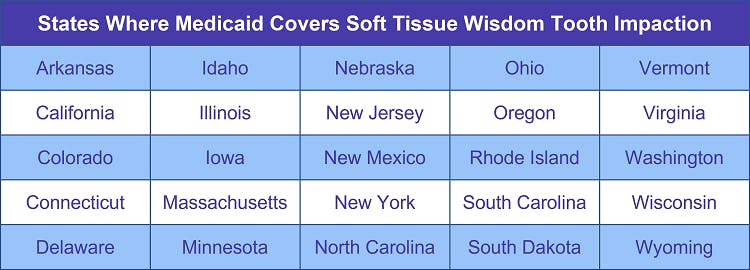
Medicaid coverage for wisdom tooth extraction varies according to where you live.
Wisdom teeth most commonly appear between the ages of 17 and 25, with some reporting wisdom teeth coming in in their late 20s. Rarely do wisdom teeth start to grow once you're 30 or older.
Since wisdom teeth are the last teeth to grow, there is often not enough space for them, which can cause them to grow in abnormal positions or not break through the gums at all. Left untreated, this can cause infections and pain, so they should be removed as soon as possible.
When will Medicaid cover wisdom tooth extraction?
Dental services covered by Medicaid vary from state to state. Depending on where you live, Medicaid might cover wisdom tooth extraction, but based on age or the type of wisdom tooth impaction. States without mandatory dental benefits through Medicaid may only cover emergency wisdom tooth removal for adults. Medicaid is required by federal law to include dental benefits for children under 18 years of age. It is best to check your specific state's Medicare program to see what is covered and how. Whether Medicaid will cover wisdom tooth removal can also be dependent on the type of impaction.
Bony wisdom teeth impaction
No matter which state you live in, Medicaid covers wisdom tooth removal for a bony tooth impaction. This type of impaction is considered a dental emergency, because it can cause cysts, infection, and severe pain. In addition to covering the tooth removal, Medicaid will also cover:
● General and local anesthesia and medications
● Panoramic radiographs
● Extractions of submerged or partially submerged third molars
Compare Medicare plans that cover dental
While it is always a good idea to act quickly on wisdom tooth removal, it is especially true in the case of bony impaction to reduce the odds of painful side effects.
Soft tissue wisdom teeth impaction
Unlike bony wisdom tooth impaction, soft tissue impaction is not considered a dental emergency, though it can still cause pain and inflammation. Some states cover teeth impacted by fibrous gum, but it is not guaranteed. As of 2022, the following states offer Medicaid coverage for soft tissue wisdom tooth impaction:

However, regardless of the list above, you should always check with your state's Medicaid program to be sure of what is covered.
It is also important to note that, in most cases, Medicaid will not cover any services outside of your home state. The most notable exception is in the case of a true medical emergency. Outside of extreme cases, wisdom teeth are considered a dental emergency and not a medical emergency. You may also receive out-of-state care if it has been pre-approved by the proper authority.
Does Medicaid cover other dental work?
As stated above, the dental services Medicaid covers depends largely on the state you live in. While some programs may include more coverage, all Medicaid programs must offer a minimum level of dental care for children. Medicaid dental benefits for children include:
● Cavity restoration
● Dental infection care
● Pain relief
● Routine teeth cleanings and maintenance
Again, some states may offer more comprehensive dental benefits and options, it all depends on where you live. But the benefits listed are available regardless of state.
How much does wisdom tooth removal cost?
The cost of wisdom tooth removal depends on your specific circumstances. If it is considered a dental emergency, you will likely pay nothing. If the tooth is not impacted, you are looking at a significantly lower cost, since there is less involved in the tooth removal.
A non-impacted wisdom tooth removal can cost anywhere between $75 and $200 per tooth.
Impacted wisdom tooth removal can cost as much as $1,000 per tooth, possibly more depending on how difficult it is to remove.
Wisdom teeth that have erupted from the gums tend to cost less to remove. If your state Medicaid program does have dental coverage, it is a good idea to check your annual coverage limits to get a better idea of cost.
Does Medicare cover wisdom tooth extraction?
Original Medicare (Medicare Parts A and B) does not cover routine dental care, and therefore would not cover wisdom tooth extraction. That being said, around 98% of Medicare Advantage plans (Medicare Part C) do include routine dental care. Part C plans are legally required to offer the same level of coverage as Original Medicare, but most also include a host of other benefits, with dental, vision, and prescription drug coverage being the most common additions.
You can also purchase a standalone plan that covers dental, vision, and hearing care, known as a DVH plan. Whether a DVH or a Medicare Advantage plan is the better choice for you depends on your specific circumstances, so if you are trying to choose between the two, be sure to make a list of all your medical needs and weigh your options.
You can also call us toll free at 888-992-0738 to speak to a licensed ClearMatch Medicare agent. They’ll answer your questions in plain English and help you choose the right coverage for your unique needs and budget.
Additional resources
- ClearMatch Medicare: Find a Medicare Plan
- Medicaid.gov: Beneficiary Resources



